- Home
- Salman Rushdie
The Enchantress of Florence Page 18
The Enchantress of Florence Read online
Page 18
Even those closest to the emperor had growing reservations and suspicions, about Mogor dell’Amore’s presence and true purposes at court. The queen mother Hamida Bano thought him an agent of the infidel West, sent to confuse and weaken their holy kingdom. In the opinion of both Birbal and Abul Fazl he was almost certainly a scoundrel, probably on the run from some dreadful deed back home, a confidence man needing to worm his way into a new life because the old one had ceased to be viable. Maybe he faced being burned to death, or hanged, or drawn and quartered, or at the very least tortured and jailed if he returned whence he came. “We should not be the innocent, gullible Easterners he takes us for,” said Abul Fazl. “In the matter of the death of Lord Hauksbank, for example, I have never ceased to be convinced of his guilt.” Birbal’s concern was for the emperor himself. “I do not think he means you any harm,” he said, “but he has woven a spell around you that may do you harm in the end, by distracting you from the great matters that should be your proper concern.”
The emperor was unconvinced, and inclined to be compassionate. “He is a homeless man looking for a place in the world,” he told them. “Down the hill at the House of Skanda he has created a kind of domesticity in a house of pleasure and made a sort of wife of a skeletal whore. How hungry for love he must be! Loneliness is the wanderer’s fate; he is a stranger wherever he goes, existing only through the power of his own will. When did a woman last praise him and call him her own? When did he last feel cherished, or worthy, or valuable? When a man is not yearned for there is a thing in him that begins to die. Optimism fades, our wise Birbal. Abul Fazl, our cautious protector, a man’s strength is not inexhaustible. A man needs other men to turn toward him by day and a woman to fold herself into his arms by night. We think he has not had such nourishment for a long time, our Mogor. There is a light in him that was almost extinguished when we met him, but it grows stronger by the day in our company, or in hers, the little Skeleton, Mohini. Maybe she is saving his life. It is true we do not know what that life has been. His name, Father Acquaviva told us, is illustrious in his own city, but if so then he has been excluded from its protection. Who knows why he was cast out? We find that we enjoy him and do not care, for the present, to unravel his mysteries. Maybe he has been a criminal, maybe even a murderer, we cannot say. What we know is that he has crossed the world to leave one story behind and to tell another, that the story he has brought us is his only baggage, and that his deepest desire is the same as poor vanished Dashwanth’s—that is, he wants to step into the tale he is telling and begin a new life inside it. In short, he is a creature of fables, and a good afsanah never did anybody any real damage.”
“Sire, I hope we do not live to learn the folly of that remark,” Birbal gravely replied.
The reputation of the late Khanzada Begum, elder sibling of the hidden princess, deteriorated as the city’s infatuation with her younger sister increased. That grand lady, who had become a heroine of the court of Akbar’s grandfather Babar when she returned home in triumph after her years of captivity with Shaibani Khan, and who had subsequently become a potent force in the Mughal household, consulted on all matters of state, now became, instead, the archetype of all cruel sisters, and her name, once so much revered, became an insult women flung at each other in anger when they wanted to make accusations of vanity, jealousy, pettiness, or betrayal. Many people began to harbor the belief that it was her treatment at the hands of Khanzada, as much as her infatuation with a foreign pasha, that had pushed the hidden princess away from her family, a choice that had led down enigmatic, unknown roads toward utter obscurity. As time went by the public mood of revulsion against the “wicked sister” began to have a more worrying consequence. Something quarrelsome rose out of the story, a green stenchy wisp of discord floated up out of the tale and infected the women of Sikri, so that reports began to reach the palace of bitter quarrels between previously loving sisters, suspicions and accusations, irreparable breaches and bitter estrangements, cat-fights and even knife-fights, the bubbling up of dislikes and resentments of which the women in question had barely been aware until the unmasking of Khanzada Begum by the foreigner with the yellow hair. Then the trouble spread more generally until it affected first cousins, then more distant relations, and finally all females, whether related or not; and even in the harem of the emperor the hubbub of enmity rose to unprecedented and wholly unacceptable levels.
“Women have always moaned about men,” Birbal said, “but it turns out that their deepest complaints are reserved for one another, because while they expect men to be fickle, treacherous, and weak, they judge their own sex by higher standards, they expect more from their own sex—loyalty, understanding, trustworthiness, love—and apparently they have all collectively decided that those expectations were misplaced.” Abul Fazl, with a sardonic edge to his voice, additionally remarked that the king’s belief in the alleged harmlessness of stories was becoming a more embattled position to defend. All three men, the courtiers and the king, knew that the war of the women was impossible for men to end. The queen mother Hamida Bano and old Princess Gulbadan were summoned to the Place of Dreams. They arrived jostling and shoving each other, each old lady complaining loudly of the secret perfidy of the other, and it became evident that the crisis had run out of control.
One of the few places in Sikri that remained immune to the phenomenon was the House of Skanda, and finally the Skeleton and Mattress marched up the hill and demanded an audience with the emperor, insisting that they had the solution to the problem. Self-preservation was their powerful motive for this outrageous act. “We have to do something,” the Skeleton had whispered to Mogor in bed at night, “otherwise five minutes from now somebody will decide that this whole commotion is your fault and then we’ll all be done for.” The emperor was both amused enough by the whores’ daring and worried enough about the situation to grant their request for an audience and summoned them to the edge of the Best of All Possible Pools. He sat in cushioned comfort on the takht in the middle of the pool and told the courtesans to get on with it. “Jahanpanah, Shelter of the World,” said the Skeleton, “you have to order all the women in Sikri to take all their clothes off.” The emperor sat up. This was interesting. “All their clothes?” he asked, just to make sure he had heard correctly. “Every stitch,” said the Mattress in deadly earnest. “Underwear, socks, even the ribbons in their hair. Let them walk around the city stark naked for one day and you’ll have no more of this nonsense.”
“The reason the trouble hasn’t spread to the whorehouses,” the Skeleton explained, “is that we ladies of the night have no secrets from each other, we wash each other’s private parts and we know exactly which bitches have the pox and which are clean. When the ladies of the city see each other naked in the street, naked in the kitchen, naked in the bazaar, naked everywhere, visible from every angle, all their faults and secret hairiness on display, they will start laughing at themselves and realize what fools they are being to think that these weird, funny creatures could be their foes.”
“As for the men,” said Mohini the Skeleton, “you must command them all to be blindfolded, and you yourself must do the same. For one day no man in Sikri will look upon a woman, while the women, seeing each other unhidden, so to speak, are coming to terms with one another once again.”
“If you think I’m doing that,” said Hamida Bano, “then that foreigner’s stories have truly softened your brain.” The emperor Akbar looked his mother in the eye. “When the emperor commands a thing,” he said, “the punishment for disobedience is death.”
The skies were kind on the day of the nakedness of the women. Clouds covered the sun all day, and a cool breeze blew. The men of Sikri did not work that day, no stores opened, the fields were empty, the doors to the studios of the artists and craftsmen were barred. Noblemen stayed in bed, musicians and courtiers alike turned their faces to the wall. And in the absence of the men the women of the capital learned all over again that they were not made of lies a
nd treasons but only of hair and skin and flesh, that they were all as imperfect as each other, and that there was nothing special they were hiding from one another, no poisons, no plots, and that even sisters can, in the end, find a way of getting along. When the sun set the women dressed again, and the men removed their blindfolds, and a meal was eaten similar to the repast taken at the breaking of a fast, a supper of water and fruits. From that day on the house of the Skeleton and the Mattress became the only nocturnal establishment to be granted the emperor’s personal seal of approval, and the ladies themselves became honored advisers to the king. There were only two pieces of bad news. The first had to do with Crown Prince Salim. In his cups, that night, he boasted to anyone who would listen that he had ignored his father’s decree, removed his blindfold, and ogled the entire female population for hours. The news reached Akbar, who ordered his son’s immediate arrest. It was Abul Fazl who suggested the most appropriate punishment for the prince’s crime. The next morning in the open space outside the royal harem he had Salim stripped naked and then beaten by guards from the harem, both eunuchs and women built like male wrestlers. They pelted him with sticks, small stones, and clods of earth until he begged for mercy and forgiveness. After that it was inevitable that the drunkard, opium-addled prince would one day attempt to be avenged on Abul Fazl and on the Emperor of Hindustan as well.
The second sad consequence of the nakedness of the women was that old Princess Gulbadan caught a chill and subsided rapidly toward death. At the very last she summoned the emperor and attempted to rehabilitate the reputation of the late Khanzada Begum. “When your father returned from his long Persian exile and found you again,” she said, “it was Khanzada Begum who had been looking after you, because Hamida Bano was not there, of course. Khanzada loved you very much, don’t forget it. She would kiss your hands and feet and say they reminded her of the feet and hands of your grandfather. So whatever the story is about her dealings with Qara Köz, remember that this is also true. A bad sister can be a loving great-aunt.” Gulbadan had always sought precision in her memory of the past, but now she began to slip into confusion, sometimes calling Akbar by his father’s name, Humayun, and sometimes even by his grandfather’s. It was as though all the first three Mughal emperors had gathered at her bedside, contained in Akbar’s body, to stand guard over her soul’s passage out of this world. After Gulbadan died, Hamida Bano was filled with dreadful remorse. “I jostled her,” she said. “I shoved her so that she almost fell, and she was my senior. I did not honor her and now she is gone.” Akbar comforted his mother. “She knew you loved her,” he said. “She knew that a woman may be a bad jostler and a good friend as well.” But the queen mother was inconsolable. “She always seemed so young,” she said. “The angel made a mistake. I am the one who was just waiting to die.”
After the forty days of mourning for Gulbadan were over, Akbar summoned Mogor dell’Amore to the Place of Dreams. “You’re taking too long,” he told him. “You can’t draw this out forever, you know. It’s time you got on with your account. Just tell the whole damn story as fast as you possibly can—and do it, please, without stirring the ladies up all over again.”
“Shelter of the World,” said Mogor, bowing deeply, “there is nothing I desire more earnestly than for my whole tale to be told, for it is what men long for above all things. But to bring the Lady Black Eyes into the embrace of Argalia the Turk, I must first explain certain military developments involving the three great powers standing between Italy and Hindustan, that is to say, Wormwood Khan the Uzbeg warlord, Shah Ishmael or Ismail the Safavid king of Persia, and the Ottoman Sultan.”
“A curse on all storytellers,” said Akbar irritably, drinking deeply from a red and gold goblet of wine. “And a pox on your children too.”
{ 15 }
By the Caspian Sea the old potato witches
By the Caspian Sea the old potato witches sat down and wept. Loudly they sobbed and wildly keened. All Transoxiana was in mourning for the great Shaibani Khan, mighty Lord Wormwood, ruler of wide Khorasan, potentate of Samarkand, Herat, and Bukhara, scion of the true bloodline of Genghis Khan, erstwhile vanquisher of the Mughal upstart Babar…
“It is probably not a good idea,” said the emperor gently, “to repeat in our presence that scoundrel’s boasts about our grandfather.”
…Shaibani the hateful, that savage rogue, who fell in the battle of Marv and was slain by Shah Ismail of Persia, who set his skull in a bejeweled, red and gold wine goblet, and sent parts of his body around the world to prove that he was dead. So perished that seasoned, though also appalling, uneducated, and barbaric warrior of sixty: quite appropriately, and humiliatingly, decapitated and dismembered by a green youth of only twenty-four.
“That’s much better,” said the emperor, regarding his own wine goblet with satisfaction. “For it cannot be called skill to kill one’s fellow citizens, to betray friends, to be without faith, without mercy, without religion; by these means one can acquire power, but not glory.”
“Niccolò Machiavelli of Florence could not have said it better,” the storyteller agreed.
Potato witchcraft was born in Astrakhan on the banks of the River Atil, afterward called Volga, brought into being by the apocryphal Witch Mother Olga the First, but its exponents had long since been divided as the world had been divided, so that now on the west coast of the Caspian Sea which they called the Khazar, near Ardabil where Shah Ismail’s Safavid dynasty had its roots in Sufi mysticism, the witches were Shiites and rejoiced in the triumphs of the new Twelver Persian empire, while on the east coast where the Uzbegs lived they were—some of them, poor, misguided wretches!—on the side of Wormwood Khan. Afterward, when Shah Ismail tasted defeat at the hands of the Ottoman army, these Sunni potato witches of the east Khazar Sea claimed that their curses had proved more powerful than the magic of their Shiite sisters in the west. For the Khorasani potato is omnipotent, they cried many times, in the words of their holiest creed, and all things may by it be accomplished.
By proper use of Sunni-Uzbeg potato-based spells it was possible to find a husband, chase off a more attractive love rival, or cause the downfall of a Shiite king. Shah Ismail had fallen victim to the rarely used Great Uzbeg Anti-Shiite Potato and Sturgeon Curse, which required quantities of potatoes and caviar which were not easy to amass, and a unity of purpose among the Sunni witches which was likewise difficult to achieve. When they heard the news of Ismail’s rout, the eastern potato witches wiped their eyes, ceased their wailing, and danced. A pirouetting Khorasani witch is a rare and particular sight, and few who saw the dance ever forgot it. And the Caviar and Potato Curse created a rift between the sisterhood of potato witches which has not been healed to this day.
There may, however, have been more prosaic reasons for the outcome of the battle of Chaldiran: that the Ottoman army greatly outnumbered the Persian; or that the Ottoman soldiers bore rifles, which the Persians thought of as unmanly weapons and refused to carry, so that they were dispatched in large numbers to inevitable but undeniably manly deaths; or that at the head of the Ottoman forces was the invincible Janissary general, slayer of Vlad the Impaler, the Dragon-Demon of Wallachia, namely Argalia the Florentine Turk. Great as Shah Ismail believed himself to be—and he was second to no man in his high opinion of himself—he could not stand for long against the Wielder of the Enchanted Lance.
Shah Ismail of Persia, the self-appointed representative on earth of the Twelfth Imam, was by repute arrogant, egotistical, and a fanatic proselytizer of Ithna Ashari, that is to say Twelver Shiite Islam. “I will break the polo sticks of my adversaries,” he boasted, in the words of the Sufi saint Shaykh Zahid, “and then the field will be mine.” Then he made a larger claim, in his own words. “I am Very God, Very God, Very God! Come now, O blind man who has lost the path, behold the Truth! I am the Absolute Doer of whom men speak.” He was called Vali Allah, the vicar of God, and to his “red-headed” qizilbash soldiers he was indeed divine. Modesty, generosity, kindness:
these were not his most renowned characteristics. And yet, when he marched south from the battlefield of Marv, accompanied by the head of Shaibani Khan in a jar of honey, and entered Herat in triumph, those were the exact words used to describe him by the princess whom history forgot, Lady Black Eyes, Qara Köz. Shah Ismail was her first infatuation. She was seventeen years old.
“So it’s true,” the emperor cried. “The foreigner who was the reason for her refusal to return with Khanzada to my grandfather’s court, the reason for her removal from the record by my noble grandfather—the seducer of whom our beloved aunt Gulbadan spoke—was not your Arcalia or Argalia, but the Shah of Persia himself.”
“They were both chapters in her story, O Shelter of the World,” the storyteller replied. “One after the other, the victor and then the victor’s vanquisher. Women are not perfect, one must admit, and it would appear that the young lady had a weakness for being on the winning side.”
Herat, pearl of Khorasan, abode of painter Behzad, the creator of matchless miniatures, and the poet Jami, the deathless philosopher of love, and last resting place of the patroness of beauty, the great Queen Gauhar Shad, which is to say, Happy or Shining Jewel! “You belong to Persia now,” Shah Ismail said aloud as he rode through its conquered streets. “Your history, oasis, baths, bridges, canals, and minarets are all mine.” Watching him from a high palace window were the two captured princesses of the Mughal house. “Now we will either die or be set free,” said Khanzada, not allowing her voice to tremble. Shaibani Khan had made her his wife and she had borne him a son. She beheld the sealed urn being carried behind the conqueror’s horse slung on a common spear and understood what it contained. “If the father is dead,” she said, “then my son is doomed as well.” Her analysis was correct; by the time Shah Ismail presented himself at the princesses’ door the boy had already been dispatched to join his father. The Persian king bowed his head before Princess Khanzada. “You are the sisters of a great brother,” he said, “and so I set you free. I have it in mind to return you with many gifts of friendship to Lord Babar, who is at present in Qunduz; and you ladies will be the greatest gifts of all.”

 Shame
Shame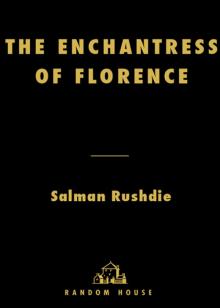 The Enchantress of Florence
The Enchantress of Florence Imaginary Homelands: Essays and Criticism 1981-1991
Imaginary Homelands: Essays and Criticism 1981-1991 Joseph Anton: A Memoir
Joseph Anton: A Memoir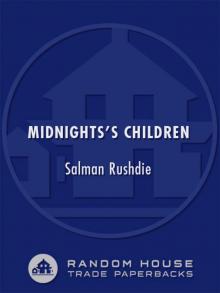 Midnight's Children
Midnight's Children East, West: Stories
East, West: Stories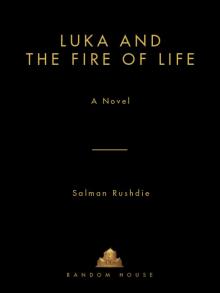 Luka and the Fire of Life
Luka and the Fire of Life Fury Fury Fury
Fury Fury Fury Haroun and the Sea of Stories
Haroun and the Sea of Stories Step Across This Line: Collected Nonfiction 1992-2002
Step Across This Line: Collected Nonfiction 1992-2002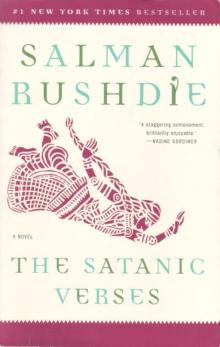 The Satanic Verses
The Satanic Verses The Moor's Last Sigh
The Moor's Last Sigh The Prophet's Hair
The Prophet's Hair The Ground Beneath Her Feet
The Ground Beneath Her Feet Two Years Eight Months and Twenty-Eight Nights
Two Years Eight Months and Twenty-Eight Nights Shalimar the Clown
Shalimar the Clown Grimus
Grimus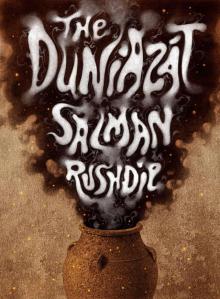 The Duniazát
The Duniazát Fury
Fury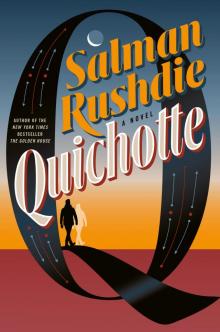 Quichotte
Quichotte The Jaguar Smile
The Jaguar Smile Joseph Anton
Joseph Anton Joseph Anton: A Memoir: A Memoir
Joseph Anton: A Memoir: A Memoir Imaginary Homelands
Imaginary Homelands The Satanic Verses: A Novel
The Satanic Verses: A Novel Step Across This Line
Step Across This Line East, West
East, West